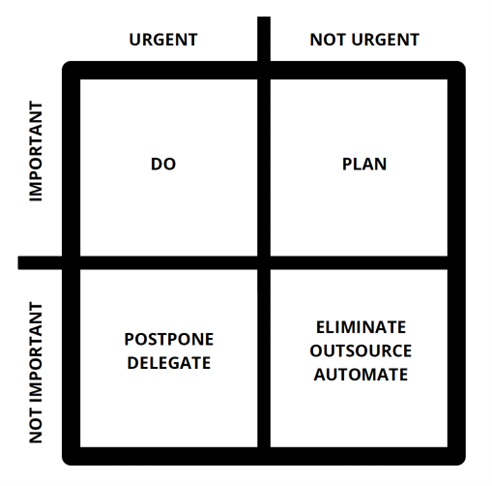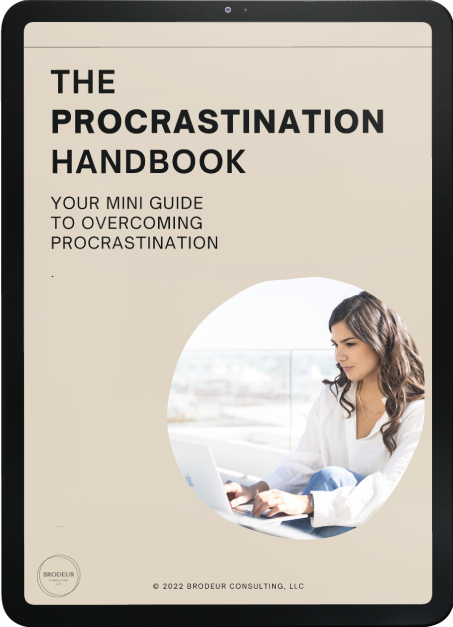Are you one of those people who are guilty of procrastination? Do you often find yourself struggling to meet deadlines or unable to manage your time properly? You are not alone. Many people struggle with procrastination, but the good news is that there are practical strategies you can implement to help you become more organized and productive. In this blog post, I will share seven time management strategies that can help you get your work and life back on track.
Table of Contents
For a step-by-step guide on how to implement some of these strategies, download your free copy of my Procrastination Handbook by clicking below:
1. Manage Your Energy
Productivity is not solely about accomplishing more in less time; it’s also about minimizing energy leaks. Energy leaks = things that pull your energy from the areas you would like to be spending it.
Do you ever notice your focus and productivity hit lows when you are drained? While getting enough sleep is obvious, managing the smaller things that drain your energy is often forgotten. Try writing a list of everything that is draining you at the moment, and then determining what you could change.
Consider this – each day we have a limited amount of mental and emotional energy to give out. Removing what is costing you energy does not always have to cost you money. Some examples:
- You’ve been secretly annoyed by your partner for something they’re repeatedly doing, so you open up a conversation to address it. Removing the tension can help remove the energy leak. Better than silently growing resentful, yes?
- You delegate a piece of a project that you hate
- You batch meetings on certain days or times, so you have longer blocks of time to work in peace
- Confront a deeper fear that is causing you anxiety and draining you every time you try to work on a task. There is a difference between laziness and emotional avoidance. You can learn more about that in my video here:
2. Avoid Perfectionism Pitfalls
Are you feeling like your progress is going a lot slower than you want it to? There’s a good chance some sneaky perfectionism is involved.
Perfectionism is not doing things perfectly. It’s expecting things to be done perfectly (very high standards) and running to the hills when there’s a chance you won’t meet your own expectations.
- All or Nothing Mentality: Are you waiting for perfect conditions? Saying: “I’ll start this once x,y,z happens”? It’s important to question this judgment because it’s often fear of failure in disguise. This can also lead you to feel “on the wagon” or “off the wagon” with your habits.
- Overthinking: This happens because you want certainty BEFORE taking action. Have you ever read an email 6x times before sending it? And even after sending gone back to re-read it? It’s important to mind this because the extra time adds up.
- People Pleasing Pitfalls: Are you constantly saying “yes” to every request and stretching yourself thin? This will slow down the speed of other projects you’re working on. Perfectionists would rather preserve their image and burnout than feel guilty saying no. By unlearning this pattern, you’ll find it’s easier to sustain your energy and stay focused.
If you manage the habits of perfectionism, people-pleasing, and overthinking, you will manage your energy and time better. They are not directly related to time management, yet all of them will increase procrastination and decrease your productivity.
Otherwise, when you don’t have perfect conditions, you won’t start. When you’re not sure “the best way to do it” you won’t do it until you have to. When you’re overwhelmed and overcommitted, your motivation will tank since you’ll always feel exhausted and behind.
3. Batch your tasks to access deeper flow states
For a quick time savor fix, consider grouping your routine tasks together. For example, I create social media videos. Instead of writing a post, filming a post, and editing a post in one setting, I will write several posts in one sitting. In the next sitting, I will film them all. In the last will edit. It’s easier for our brains to monotask. Studies show every time you switch tasks it takes anywhere from 15 – 30 minutes to get back into a flow state.
It also does not just have to be with tasks. If possible, you can group your meetings together, on certain days, or certain time periods during the week.
4. Use the Eisenhower Matrix to help you prioritize your tasks
It’s essential to prioritize your tasks so that you can focus on the most important things. When left unmanaged, it’s a normal tendency to reach for easier tasks that are seemingly urgent, like immediately responding to an email. The Eisenhower Matrix helps you determine urgency vs importance. Sometimes we perceive things like an email as urgent and want to reply right away, but it can often fall under the important/not urgent category and you can delay the response.
- If it is urgent & important, move it to the top of your list
- If it is not urgent & important, position it behind the items that will move the needle
- If it is urgent & not important, tell the appropriate personnel you can’t get to the task at this time, or delegate the task to someone else
- If it is not urgent & not important, try to cut this task out of your responsibility

In conclusion, managing your time effectively is crucial if you want to achieve your goals, but the best solutions are not as obvious. Productivity is not just about how much you do, it’s about how effective you are. It is hard to be effective when your energy is drained, you’re reactive to your day, and you’re multitasking.
For a step-by-step guide on how to implement some of these strategies to improve productivity, organization, and focus, download your free copy of my Procrastination Handbook by clicking below:

